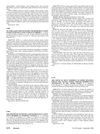 17 citations,
May 2011 in “Movement Disorders”
17 citations,
May 2011 in “Movement Disorders” Finasteride significantly reduced tics and obsessive-compulsive symptoms in patients with Tourette syndrome.
[object Object]  39 citations,
May 2011 in “Movement Disorders”
39 citations,
May 2011 in “Movement Disorders” Finasteride may help reduce symptoms in male Tourette syndrome patients.
 2 citations,
August 1997 in “Postgraduate Medicine”
2 citations,
August 1997 in “Postgraduate Medicine” Hair loss common in men and women, limited treatments available.
 46 citations,
June 2018 in “American Journal of Clinical Dermatology”
46 citations,
June 2018 in “American Journal of Clinical Dermatology” Hair loss is common in lupus patients and can be permanent or reversible, depending on the type, with various treatments available.
 July 2015 in “British Journal of Dermatology”
July 2015 in “British Journal of Dermatology” Treating skin conditions with both psychological and dermatological care improves patient outcomes and can save costs.
 5 citations,
January 2013 in “Journal of Cosmetics, Dermatological Sciences and Applications”
5 citations,
January 2013 in “Journal of Cosmetics, Dermatological Sciences and Applications” New treatments for hair loss are promising.
 88 citations,
January 2013 in “Indian Journal of Dermatology, Venereology and Leprology”
88 citations,
January 2013 in “Indian Journal of Dermatology, Venereology and Leprology” Minoxidil and finasteride effectively treat hair loss.
 138 citations,
March 2001 in “Clinics in Dermatology”
138 citations,
March 2001 in “Clinics in Dermatology” Hair loss can significantly affect a person's self-esteem and body image, especially in young people, those who value their looks highly, and women.
 June 2016 in “CRC Press eBooks”
June 2016 in “CRC Press eBooks” Sleep problems and skin issues affect each other; poor sleep can worsen skin conditions, and some skin treatments can improve or harm sleep quality.
 3 citations,
December 2019 in “Journal of Cosmetic and Laser Therapy”
3 citations,
December 2019 in “Journal of Cosmetic and Laser Therapy” PRGF treatments increased hair number and thickness in people with hair loss, with more injections leading to better results.
July 2024 in “International Journal of Molecular Sciences” RF-based therapies might help treat hair loss.
 1 citations,
July 2023 in “Biomimetics”
1 citations,
July 2023 in “Biomimetics” A new hair treatment using a natural polyphenol complex improves hair strength, reduces static, and protects against UV damage.
[object Object]  April 2015 in “Cambridge University Press eBooks”
April 2015 in “Cambridge University Press eBooks” Many women experience sexual dysfunction, but few seek help, and better treatment and medical training are needed.
 2 citations,
September 2008 in “Fertility and Sterility”
2 citations,
September 2008 in “Fertility and Sterility” Women with PCOS and higher BMI, especially those with morbid obesity, are at greater risk for depression.
 September 2018 in “Asian journal of pharmacy and pharmacology”
September 2018 in “Asian journal of pharmacy and pharmacology” Honey has many health benefits and is good for you.
 11 citations,
July 2020 in “Journal of Cosmetic Dermatology”
11 citations,
July 2020 in “Journal of Cosmetic Dermatology” Sandalore® improves hair growth and quality in people with hair loss.
 1 citations,
February 2004
1 citations,
February 2004 Skin diseases are common and can significantly affect people's lives; better outcome measures and ethical clinical trials are needed to improve dermatology care.
 16 citations,
March 2007 in “The Veterinary clinics of North America. Food animal practice”
16 citations,
March 2007 in “The Veterinary clinics of North America. Food animal practice” Proper mineral supplementation in cow-calf operations prevents health issues and economic losses.
 31 citations,
October 2002 in “Dermatologic Surgery”
31 citations,
October 2002 in “Dermatologic Surgery” Minoxidil helps stabilize hair loss, increase density, and reduce shedding after hair transplant surgery.
 September 2024 in “Journal of Investigative Dermatology”
September 2024 in “Journal of Investigative Dermatology” A new tool can analyze hair to detect changes due to hormones, genetics, and aging.
 February 2024 in “International Journal For Multidisciplinary Research”
February 2024 in “International Journal For Multidisciplinary Research” The herbal hair oil with natural extracts can improve hair health and reduce dandruff.
 130 citations,
January 2005 in “American Journal of Clinical Dermatology”
130 citations,
January 2005 in “American Journal of Clinical Dermatology” Eating disorders like anorexia and bulimia cause skin problems, and dermatologists can help detect these disorders early for better treatment outcomes.
March 2021 in “Cell stem cell” Skin cell behavior is influenced by the tightness of nearby cells, affecting their growth and development.
 3 citations,
January 2018 in “İstanbul Kuzey Klinikleri”
3 citations,
January 2018 in “İstanbul Kuzey Klinikleri” Hair loss was found in 37.4% of surveyed rural high-school students in Eskisehir, Turkey, affecting their quality of life, especially in general health and mental well-being.
 97 citations,
September 2006 in “Pharmaceutical Research”
97 citations,
September 2006 in “Pharmaceutical Research” No treatment fully prevents hair loss from chemotherapy yet.
 41 citations,
May 2018 in “Nutrition and healthy aging”
41 citations,
May 2018 in “Nutrition and healthy aging” Skin aging is largely due to differences in stiffness and elasticity between skin layers, leading to wrinkles.
 January 2022 in “Clinical dermatology open access journal”
January 2022 in “Clinical dermatology open access journal” Certain cannabinoids may help increase hair growth and could be useful for treating hair loss.
 January 2025 in “Scholars Journal of Medical Case Reports”
January 2025 in “Scholars Journal of Medical Case Reports” Quetiapine may cause hair loss.
 1 citations,
July 2015 in “Cambridge University Press eBooks”
1 citations,
July 2015 in “Cambridge University Press eBooks” Testosterone therapy can improve sexual function in women but long-term safety is unclear.
 January 2024 in “International Journal of Health Science”
January 2024 in “International Journal of Health Science” Scalp cooling and low-power light therapy show promise in reducing chemotherapy-induced hair loss but need more research.




























